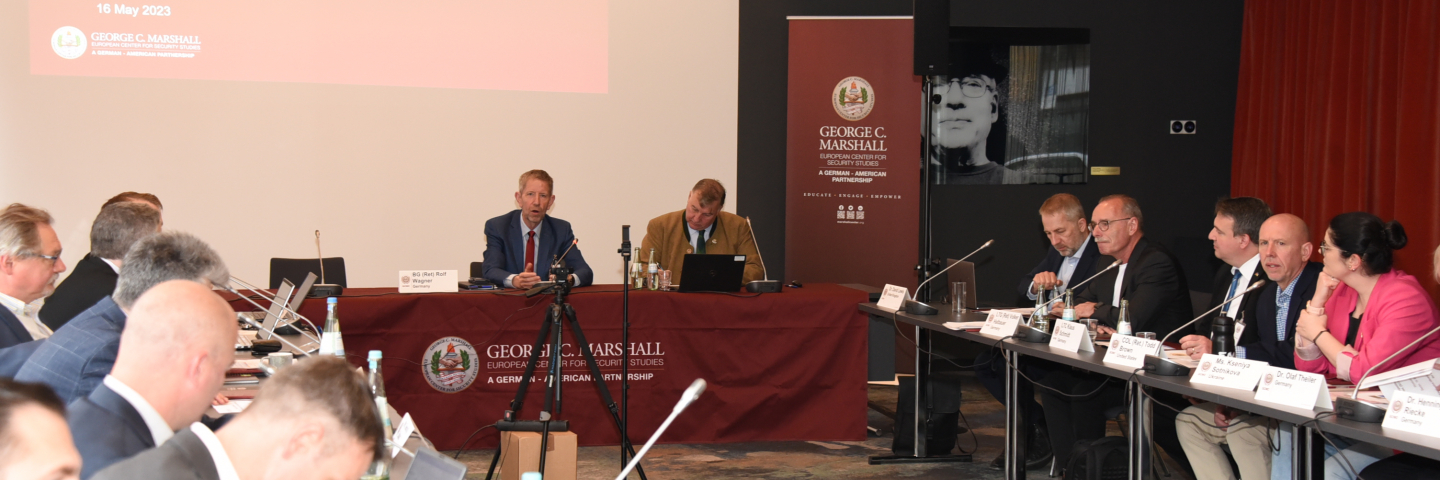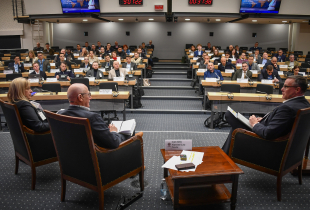
Alternative Ukrainian Future Trajectories: Implications for Russia and the West
Research Workshop II 16 May 2023, Berlin
The “Ukraine End State” George C. Marshall Center’s Research and Policy Analysis Department project, mandated by the U.S. European Command Combatant Commander and Supreme Allied Commander Europe, brought together over 25 subject matter experts in Berlin on May 16 to explore the security implications of alternative futures across the eastern flank. Retired Brig. Gen. Rolf Wagner, German Deputy Director of the Marshall Center, welcomed the participants coming from Ukraine, Poland, Georgia, Moldova, Hungary, Norway, Sweden, the UK, Germany, and the United States.
Divided into three working groups (“syndicates”), the workshop developed more detailed pathways for Ukraine based on three different intermediate scenarios: (a) “protracted conflict with Russia”, (b) “frozen conflict”, and (c) “negotiated peace”. The Marshall Center collaborated again with the German Federal Ministry of Defence and its Defence Planning Office.
In the afternoon session, the syndicates presented their results by assessing the implications of each scenario for the High North, Central Europe, and South East Europe (threats and security implications?). All groups also reflected on what the specific trajectories meant for Ukraine, Russia, and the “political West”. Some of the key take-aways across all scenarios and pathways included the following:
- Europe faces unremitting Russian unconventional or hybrid activities designed to challenge Western unity in EU and NATO over time and disrupt Ukraine’s accession to both organizations
- Western material and psychological support is critical – support/cohesion reduces, fatigue increases over time - misunderstandings and risks increase – but there are opportunities to mitigate with a Ukraine theory of victory;
- Russian conventional capability reconstruction timeline is critical;
- Ukraine develops a credible force structure mix of capability and deterrence that deters Russia;
- China exploits opportunities for influence, Russian dependency on China increases;
- Belarus nuclearization and creeping annexation ongoing;
- U.S. pressure on European allies to take on primary responsibility for defense (U.S. priority focus in Asia).
- Increased power projection and militarization by Russia in the High North, with potential threats to critical infrastructure, the Finnish-Russian border, and/or the status of Svalbard; the High North could be used for Russia’s nuclear signaling;
- In South East Europe, Turkey and the Turkey-Russia relationship will play a crucial role for the stability or instability of both the Black Sea and the Eastern Mediterranean;
- Russia has been humiliated by the success of Ukrainian resistance, irrespective of the outcome of the war. This will leave Russia with an intrinsic motivation for revanche and retaliation.
- Russia and the “West” do have different conceptions of negotiation. While the West enters negotiations with the aim to reduce or stop conflict and violence, Russia traditionally follows a sequential approach where escalation of a conflict may serve to drive or channel negotiations.
The workshop also hosted the monthly virtual session of the Strategic Competition Seminar Series, combining the in-person participants of the workshop with an online audience in a hybrid format. Russia expert Dr. Mark Galeotti and Dr. Stefan Meister from the German Council on Foreign Relations (DGAP) discussed potential variables, inflection points, and game changers for political developments in Russia. The debate, moderated by Dr. Graeme Herd, focused on the question to what extent the political elite in Moscow is unified or fragmentated, and how Russia might construct its narrative in the course of the coming weeks and months, in order to persist as a great power in global affairs.
